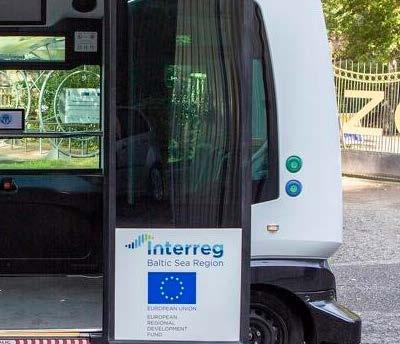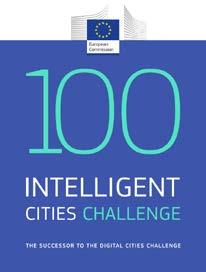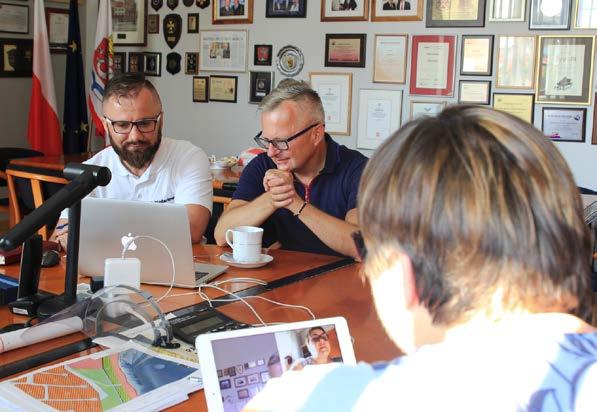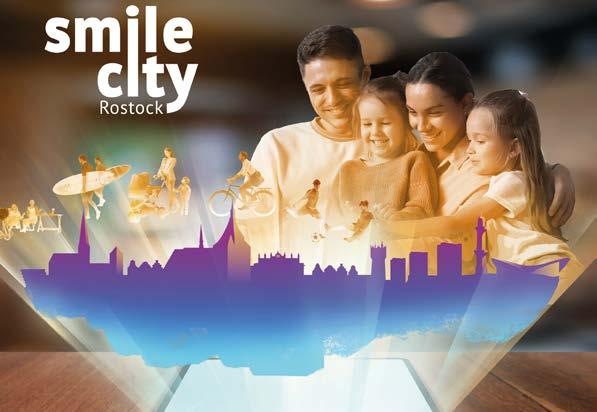
5 minute read
Interconnect” successfully finalized
SUCCESSFULLY FINALIZED
by Andreas Schubert | andreas.schubert@rostock.de
Advertisement
The Regiopole Rostock sees itself as an efficient city in the Baltic Sea region, ideally located between the metropolitan region of Berlin, Hamburg and Copenhagen / Malmö. Rostock has traditionally been functionally and emotionally connected with the Baltic Sea region and owes its prosperity and reputation to the good cooperation in the Baltic Sea Region.
This potential has been leveraged since the 1990s and turned out to be an advantage for Rostock’s development. Since the mid-2000s the city administration has been collecting targeted EU funding from the Interreg programs “Baltic Sea” and “South Baltic Region” in order to improve the travel conditions for pedestrian passengers between Rostock and Southern Denmark.
With the Interreg project “Interconnect”, a project family for Rostock and the partner municipality Guldborgsund is coming to an end – being visible by means of the City Light campaign in Rostock which is running since October 6 2020. “We have achieved our goals”, says the long-time project manager Dr. Andreas Schubert.
“Thanks to the consistent implementation of our early formulated goals, we enjoy the reputation of a flagship project in the implementation of the EU Strategy for the Baltic Sea Region. Now it is attractive again to travel to Scandinavia via Gedser as a pedestrian passenger.”
In Trelleborg, too, the interfaces between the ferry terminal and local public transport are now well organized. We have new terminals, new ferries, coordinated timetables and worthwhile travel destinations connected with the attractive multimodal passenger transport offer in the travel information system of DeutscheBahn.de and Reiseplanen.dk. Karin Wohlgemuth from the Rostock Mayor’s Office is forging future plans with Frede Danborg from Guldborgsund Kommune and the free artist Stefanie Rübensaal from Rostock. Stefanie (left) is happy about the invitation to Guldborgsund to curate an art exhibition there. are happy to offer our tourists short trips to the beautiful city of Rostock. We are in droves at the Hanse Sail or at the Rostock Christmas Market.”
“We have always been able to rely on the cooperation between the regional bus operator Movia, the Warnow Verkehrsverbund and Scandlines. Our municipality of Guldborgsund is offering more destinations as usually known. For example, do you know our restored railway museum in Gedser? Have you ever been to the Vogelsang Art Museum or the Middle Age Center? To these and many more destinations you can also take the public transport on the Rostock and Guldborgsund side.” Michael Dietz, Manager at Scandlines Germany: “We too want to help to ensure that even more Danish guests visit Rostock and German passengers visit Guldborgsund.”
Despite the corona situation, day visitors are welcome in both Rostock and Guldborgsund. Car passages and InterCombiTickets for pedestrian passengers can be booked online. For passengers who arrive at the terminal by public transport or by car and wish to continue as pedestrian, there are pedestrian ticket machines in the ferry terminal. In the off-season the price for a return trip is only € 13.
Rostock’s Mayor Claus Ruhe Madsen is looking ahead: “The Rostock Regiopole has been consolidated. Now it is important, on the one hand, to boost the cooperation with partners in the Baltic Sea Region everyday life for large segments of the economy, science and civil society, and to allow service providers from the Baltic Sea Region to find their new home address in Rostock”. 21
GDAŃSK JOINS
THE INTELLIGENT CITIES CHALLENGE
by Joanna Tobolewicz | joanna.tobolewicz@gdansk.gda.pl in research projects carried out in cooperation with the city,

Gdansk was qualified by the European Commission to the Intelligent Cities Challenge. The city has always been following the latest trends supporting the smart development. Therefore, when the Intelligent Cities Challenge was launched, Piotr Borawski, Deputy Mayor of the City of Gdansk on Entrepreneurship and Climate Protection, set up a design team to prepare the application.
During the application preparation process, the European Commission worked closely with representatives of Gdansk, providing feedback to the city team. A broad pareconomic development of cities.
tnership was established that includes the City of Gdansk, the STARTER incubator and the PICTEC foundation. The proposal was also supported by the Gdansk University of Technology, the Higher School of Banking, the University of Gdansk and the INTERIZON cluster.
Since the main objective of the programme is to support cities in the development and implementation of smart tools, in the application we focused on the challenges defined by the inhabitants: the use of renewable energy sources in the city, the development of the professional potential of resi“Gdansk is intensively preparing for the challenges of adaptation to climate change, noting the important role of modern technologies and readiness to acquire new professional competences by all inhabitants (so-called life-long learning). I am pleased that the European Commission has recognised and appreciated our actions, such as the establishment of an eco-patrol of the City Guard, the introduction of low retention solutions and the involvement of Gdansk the scientific sector and EU partners”, says Piotr Borawski, Deputy Mayor of Gdansk.
An important aspect that has emerged in the ICC recently will also be the use of technology to deal with the challenges that cities face in tackling the effects of the coronavirus pandemic. As the organisers convince, in the current situation, smart city solutions can be the basis for rebuilding the dents and the digitization of the city office.
For a period of two years, Gdansk will receive tailor-made support in the field of education and skills of older people, digitization of public services, development of renewable energy sources and improving energy efficiency.
THE INTELLIGENT CITIES CHALLENGE

An important aspect that has emerged in the ICC recently will also be the use of technology to deal with the challenges that cities face in tackling the effects of the coronavirus pandemic. As the organisers convince, in the current situation, smart city solutions can be the basis for rebuilding the economic development of cities.
For a period of two years, Gdansk will receive tailor-made support in the field of education and skills of older people, digitization of public services, development of renewable energy sources and improving energy efficiency.
The programme provides the possibility of benefiting from the experience of more developed cities in these areas, e.g. Singapore, Amsterdam and Phoenix. Also it offers an access to the services of the globally recognized consultancy companies. Gdansk will be supported by KPMG.
Moreover, the information exchange between specialists from the 126 cities participating in the project is very important. Gdansk would like to invite local governments affiliated to the association Metropolitan Area Gdansk Gdynia Sopot. Thus, the project has the opportunity to become a Photo: Jerzy Pinkas / www.gdansk.pl platform for the exchange of expertise on the biggest challenges faced today by the EU countries.











